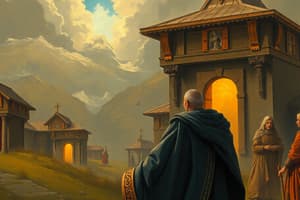Podcast
Questions and Answers
What was one of the key factors that contributed to the rise of the Reformation?
What was one of the key factors that contributed to the rise of the Reformation?
Martin Luther intended to create a new church separate from the Roman Catholic Church.
Martin Luther intended to create a new church separate from the Roman Catholic Church.
False
What did the invention of the printing press lead to in relation to literacy and religious understanding?
What did the invention of the printing press lead to in relation to literacy and religious understanding?
Increased literacy and the ability for more people to read the Bible in their own language.
Martin Luther wrote a pamphlet containing _____ reforms he disagreed with.
Martin Luther wrote a pamphlet containing _____ reforms he disagreed with.
Signup and view all the answers
Match the following terms with their descriptions:
Match the following terms with their descriptions:
Signup and view all the answers
What was Luther's main belief regarding salvation?
What was Luther's main belief regarding salvation?
Signup and view all the answers
Luther's 95 Theses criticized the power of the Pope and the wealth of the Church.
Luther's 95 Theses criticized the power of the Pope and the wealth of the Church.
Signup and view all the answers
What was the main purpose of the Spanish Inquisition?
What was the main purpose of the Spanish Inquisition?
Signup and view all the answers
John Calvin formed __________, which emphasized hard work and personal responsibility.
John Calvin formed __________, which emphasized hard work and personal responsibility.
Signup and view all the answers
Match the following figures with their associated movements:
Match the following figures with their associated movements:
Signup and view all the answers
Which of the following actions did King Henry VIII take regarding the Catholic Church?
Which of the following actions did King Henry VIII take regarding the Catholic Church?
Signup and view all the answers
The Reformation led to a single unified church throughout Europe.
The Reformation led to a single unified church throughout Europe.
Signup and view all the answers
What contributed to the shift of power from rural to urban areas?
What contributed to the shift of power from rural to urban areas?
Signup and view all the answers
The use of gunpowder allowed monarchs to overpower nobles and expand their territories.
The use of gunpowder allowed monarchs to overpower nobles and expand their territories.
Signup and view all the answers
What technological advancement contributed to a common sense of national identity?
What technological advancement contributed to a common sense of national identity?
Signup and view all the answers
Mercenaries were hired by monarchs through the use of _____.
Mercenaries were hired by monarchs through the use of _____.
Signup and view all the answers
Which of the following factors was NOT a reason for states evolving into countries?
Which of the following factors was NOT a reason for states evolving into countries?
Signup and view all the answers
Citizens during this period felt less allegiance to their monarchs due to social mobility.
Citizens during this period felt less allegiance to their monarchs due to social mobility.
Signup and view all the answers
What was one effect of new discoveries during exploration?
What was one effect of new discoveries during exploration?
Signup and view all the answers
Common national languages helped establish a sense of ______ among the people.
Common national languages helped establish a sense of ______ among the people.
Signup and view all the answers
Match the following concepts with their descriptions:
Match the following concepts with their descriptions:
Signup and view all the answers
What was a main reason for European expansionism during the Age of Exploration?
What was a main reason for European expansionism during the Age of Exploration?
Signup and view all the answers
The Age of Exploration occurred between the years 1400 and 1600.
The Age of Exploration occurred between the years 1400 and 1600.
Signup and view all the answers
Who believed in a spherical Earth and influenced the idea that sailing west would reach Asia?
Who believed in a spherical Earth and influenced the idea that sailing west would reach Asia?
Signup and view all the answers
Rulers funded voyages to find new routes due to the fall of __________ in 1453.
Rulers funded voyages to find new routes due to the fall of __________ in 1453.
Signup and view all the answers
Match the scientists or thinkers with their contributions to geography:
Match the scientists or thinkers with their contributions to geography:
Signup and view all the answers
What phrase did many Italian merchants use to express their motivation for trade?
What phrase did many Italian merchants use to express their motivation for trade?
Signup and view all the answers
European merchants relied solely on the Silk Road for Far East trade.
European merchants relied solely on the Silk Road for Far East trade.
Signup and view all the answers
What was considered crucial for Europe after 1453?
What was considered crucial for Europe after 1453?
Signup and view all the answers
Merchants formed alliances to fund trips and share __________ from the goods obtained.
Merchants formed alliances to fund trips and share __________ from the goods obtained.
Signup and view all the answers
Study Notes
Western Worldview and the Renaissance
- The Renaissance period significantly impacted Western views.
- The Reformation challenged existing religious authority and led to new, competing religious views.
- Humanist thought questioned religious practices and teachings, highlighting personal interpretation.
- New religious views influenced societal structures and identities
Causes of the Reformation
- The Hundred Years' War and the Black Death impacted societal stability.
- Scientific discoveries challenged some Church doctrines.
- Corruption within the Catholic Church prompted reform.
- The printing press facilitated wider access to religious texts.
Two Views of Religion During the Renaissance
- One perspective emphasized following Church rules and rituals.
- The humanist perspective encouraged questioning Church doctrine and relying on personal interpretations of the Bible.
Reformation
- Some sought change within the Catholic Church, leading to the Protestant Reformation.
- The Protestant Reformation separated from the Catholic Church and formed new denominations.
- The printing press allowed the Bible to be translated into vernacular languages, increasing literacy and enabling personal interpretations of scripture.
- Literacy increased, contributing to the expansion of ideas like humanism.
Martin Luther
- Martin Luther, a German priest, challenged Church practices and teachings.
- Luther's Ninety-Five Theses detailed his complaints against the Church and sparked widespread discussion, leading to support for religious reform.
- Luther believed faith, rather than good deeds, was the path to salvation.
- Luther's actions led to the birth of Protestantism.
Branches of Protestantism
- The Reformation led to various Protestant denominations.
- Religious differences among groups led to divisions in Europe.
- New churches emerged, each holding slightly different beliefs and views on religious practice.
Summary of Religious Reform in Europe
- Switzerland became home to the Calvinist movement.
- Anglicanism established itself in England.
- Scotland embraced Presbyterianism.
- The Dutch Reformed church gained influence in Holland.
- Huguenots formed in parts of France.
- A new form of Christianity emerged in Germany.
- Spain experienced the Spanish Inquisition, persecuting heretics
Effects of the Reformation
- The Reformation disrupted the existing hierarchical social order.
- People began to see themselves as citizens, shifting allegiances.
- The Reformation contributed to increased political and economic centralization.
- National identities developed, based on shared culture and language.
How Did Ideas of National Identity and Citizenship Develop During the Renaissance
- Urbanization contributed to the formation of states and the development of new identities based on shared culture and language.
- Common language, religion, and life beliefs fostered national identities.
- Military strength and the printing press played key roles in solidifying national identities and expanding territories.
States to Countries
- The use of gunpowder and mercenaries gave monarchs more power, allowing them to expand their territories.
- Printing presses played a role in fostering a shared national identity by spreading common histories.
- Exploration resulted in the expansion of national resources and claims, leading to greater national pride.
Changes in European Society
- Citizens became more loyal to monarchs.
- Exploration fostered a sense of optimism and the value of new lands.
- Social mobility was made easier but serfdom remained.
- Public services began to be provided by the central government.
- Monarchies contended with the Church for influence and authority.
Political and Economic Systems
- Monarchs consolidated governmental authority and resources.
- Taxation fueled military expansion.
- National policies developed to control trade, particularly trade routes to the east.
Culture
- Common languages emerged, uniting various communities.
- Middle classes became more educated, learning about their culture.
- Religious documents were translated, strengthening a shared sense of national identity.
- National languages became more widely adopted and used.
How Did a Spirit of Exploration Become Part of the Western Worldview?
- European trade with other cultures intensified, motivating further exploration.
- The desire to control trade routes and establish new empires spurred exploration.
- Exploration contributed to knowledge about the world.
- Technological advancements aided in the exploration of new lands and trade routes, inspiring further expansionism.
The Need for New Trade Routes
- Europeans sought alternative trade routes to the far east to meet demands.
- Merchants collaborated to fund expeditions.
- Trade was increasingly important to European economies.
- Trade routes via the Silk Road were facing limitations.
New Ideas and Knowledge
- Geographical knowledge of the world expanded.
- Improvements in shipbuilding, navigation, and cartography allowed for longer voyages.
- Concepts of exploration and discovery gained prominence.
- Improved mapping technologies supported widespread sharing of knowledge about discovery.
Henry the Navigator
- Henry the Navigator established a school for navigation in Portugal.
- Scholars from Europe and the Middle East collaborated to improve sailing techniques, instrument, and mapping.
- He required captains to document journeys and information, which helped for future expeditions.
How Did the Age of Exploration Begin?
- Increased consumerism fueled a race to claim new lands.
- Portugal and Spain were rivals in the exploration of new territories.
- England eventually became a leading power in territorial expansion.
- France pursued expansion to capitalize on global trade.
- Technological advancements in navigation and ships played a significant role in the Age of Exploration.
Portugal
- Portugal sought a sea route to Asia, leading them along the African coast.
- Established trade centers in Asia, like Macau.
- Explorers like Diaz and da Gama were pivotal in charting new routes and opening trade.
Spain
- Spain was motivated to control trade routes and claim territories, rivaling Portugal.
- Columbus, funded by Spain, failed to reach Asia by sailing west but discovered the Americas instead.
- Spain established territories in the Americas and Asia.
Magellan
- Magellan's voyage circumnavigated the globe.
- Discovered the Strait of Magellan in South America, further connecting the Atlantic and Pacific oceans.
- His success aided in understanding of the globe's interconnectedness.
Exploration Activity - Discussion Topics
- The impact of new territories on global trade.
- The impact of exploration and trade on the European economy.
- The spread of technological innovations.
Studying That Suits You
Use AI to generate personalized quizzes and flashcards to suit your learning preferences.
Related Documents
Description
Test your knowledge on the key aspects of the Renaissance and the Reformation period. Explore how these movements influenced Western worldview, societal structures, and religious practices. Understand the impacts of humanist thought and the role of the printing press in shaping religious views.





